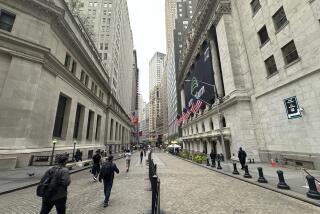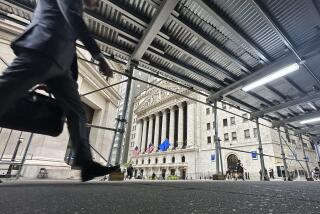Dollar Hits Record Low Against Yen
The troubled dollar closed below 100 yen in New York on Tuesday for the first time ever, as long-term interest rates rose on inflationary fears. The falling dollar and rising interest rates bedeviled stocks and the market closed broadly lower.
Higher rates are generally supportive of a currency--but not until investors consider they have reached a level where inflation does not pose any threat to long-term returns.
The dollar began its slide as the Commerce Department reported that sales of new homes surged 4.2% in May and the Conference Board said consumer confidence rose in June to the highest level in four years.
The financial markets quickly concluded that four increases in short-term interest rates this year may not really have dampened the pace of expansion nor quelled the inflationary pressures that usually accompany growth.
This sent bond yields soaring and stocks tumbling, and traders said foreign investors were among the sellers.
“It’s a vicious cycle,” said one market player, adding that the drop in stocks and bonds was depressing the dollar which, in turn, was dragging U.S. financial assets lower.
In New York, the dollar set another record low against the Japanese yen and sold near a 13-month low against the German mark. The dollar fetched 99.95 Japanese yen, its lowest level since exchange rates were established in the 1940s and down from 100.45 Monday. It fell to 1.580 German marks, down from 1.584 marks.
Bond rates rose sharply on the two reports, with the key 30-year bond rising to 7.52% from 7.45% on Monday.
Both reports aroused worries among fixed-income investors that a strengthening economy could trigger inflation and hurt the value of their bonds, which pay a set rate of interest.
Supporting that view was a sharp rise in daily prices of many commodities, led by coffee, corn and soybeans.
A flurry of renewed buying late in the session helped the stock market finish well above its worst levels. The Dow Jones average ended off 15.86 points at 3,669.64 after showing a deficit of around 45 points at its lowest.
Declining stocks outnumbered advances by about 7 to 4 on the New York Stock Exchange. Volume on the Big Board’s floor came to 267.74 million shares compared to 250.11 million Monday.
Waves of computer-guided program selling periodically swept over the stock market and intensified the decline.
Among the market highlights: * Auto stocks, which were among the leaders in Monday’s strong market, shifted into reverse. General Motors fell 1 1/4 to 51, Chrysler dropped 1/4 to 47 1/2 and Ford lost 5/8 to 59 1/8.
* Corning rose 1 7/8 to 33 1/8 after reporting a rise in second-quarter earnings.
* Walgreen shed 1 3/4 to 37. Merrill Lynch downgraded its near-term rating on the stock to “above average” from “buy,” saying the company’s operating earnings were “a little” weaker than expected.
* Heart valve maker St. Jude Medical rose 2 1/4 to 30 3/4 after saying it will acquire Siemens pacemaker business.
* ValuJet Airlines, an initial public offering, ended at 16 1/8, up from the offering price of 12 1/2.
* The most heavily traded Big Board stock was the Vodafone Group, which rose 3/4 to 73 7/8.
Solid gains in overseas markets apparently didn’t impress Wall Street. Stocks ended sharply higher in Tokyo, with the Nikkei recouping much of Monday’s 465.79-point plunge. The 225-share Nikkei average closed up 338.27 points or 1.67% at 20,639.23. Meanwhile, Frankfurt’s 30-share DAX average ended at 2,018.26, up 29.66 points.
More to Read
Inside the business of entertainment
The Wide Shot brings you news, analysis and insights on everything from streaming wars to production — and what it all means for the future.
You may occasionally receive promotional content from the Los Angeles Times.










